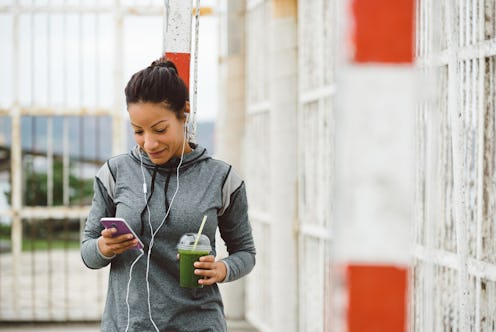Life
Science Says This Is The BEST Time To Eat Protein When You're Working Out

If you're exercising regularly, particularly if you happen to be using weights, you've likely heard a lot of talk about the importance of protein to help your muscles. But what does protein actually do for the body when you work out — and when should you eat it to maximize its benefits?
According to Dr. Robert Zembroski, a clinical nutritionist and author of the Rebuild series, it's all about nitrogen. "Eating protein is about nitrogen balancing," he tells Bustle. "Nitrogen balancing refers to the amount of nitrogen taken into the body minus the amount lost." And when it comes to protein consumption, nitrogen becomes vitally important. "The protein you eat is broken down into amino acids, which are then broken down into nitrogen needed for normal cellular function and muscle retention and growth," he explains.
So how does working out affect your body's nitrogen levels? It's all a matter of muscles. "When muscles are overloaded during a workout, they use up protein (nitrogen)," says Dr. Zembroski. "Ideally, to retain and build muscle you want to be in a state of positive nitrogen balance. Exercising without adequate protein intake will create a negative nitrogen balance and muscle protein breakdown." This happens because body will search for nitrogen and use up muscle instead. "If there is no protein for muscles to use, your muscle protein is broken down and converted to sugar for fuel. This is called gluconeogenesis," says Dr. Zembroski. And that's not ideal if you want to get stronger; your muscles need good doses of protein to help them function and grow.
When it comes to making sure your body's nitrogen levels are suitably boosted, fueling up on protein before a workout is key — but so is making sure you still have nitrogen reserves afterwards, notes Dr. Zembroski. "It’s best to eat protein before and certainly after the workout," he tells Bustle. "Eating protein before you work out will put you into a positive nitrogen balance and prevent muscle loss. But refueling after a workout restores nitrogen balance and is crucial to preventing muscle loss, as it stimulates muscle protein synthesis leading to muscle growth. It's important for muscle growth, recovery, and performance."
This might be a lot to take in, but it comes down to something simple: protein is important, before and after you get in your reps or take that spin class. "Consider 30-40 grams of protein 1.5-2 hours before your workout and up to 40 grams of protein immediately after your workout," recommends Dr. Zembroski. Whether that's a protein shake beforehand and an omelette afterwards, or some other arrangement that suits your lifestyle, it's crucial that you make sure you're fully stocked on protein sources.
"Fueling your body before and right after your workout will help you stay in nitrogen balance and create a lean, healthy body composition," Dr .Zembroski tells Bustle. And luckily for everybody, high-protein foods include eggs, yogurt, lean beef, tuna, fish, and peanuts — all hugely tasty treats. So get invested in protein-rich foods and be prepared to feel those biceps. Even if they're hurting like heck after the gym, they'll be thanking you for all the nitrogen.
This article was originally published on